More Than Enough: Giving out of Abundance
Blog / Produced by The High Calling
I’ve been to places in Africa where having a little extra money meant a mother had enough to buy meat and bread for her children. She didn’t have (or need) extra money to buy video games and toys, but an upgrade in the nutritional value of their food made a significant impact on her family’s health and well-being. Most of us in the United States don’t spend our extra money on those kinds of “luxuries.”
A few years later, while working on a project to build a school in Haiti, I learned that only half of the children are able to attend primary education, and only 20% make it into secondary level. Here in the United States, my kids don’t have to worry about making it all the way through high school. With a high school diploma, they’ll have more education than 80% of Haitians.
Jen Hatmaker pointed out in 7: An Experimental Mutiny Against Excess, that if you earn more than $35,000 per year, then you are in the top 4% wealthiest people in the world. Furthermore, if you earn more than $50,000 per year, then you are in the top 1% of the wealthiest people in the world. With the median annual household income in the United States averaging well over $50,000 since the mid-90’s, that means the average American is among the 1%.
When I look around, I can always find someone who has more than me. More money, more education, a better job, a bigger house, or a nicer car. In fact, when we compare ourselves to others around us, it’s difficult to see how much we really have. But if we look beyond our borders, then it’s easy to see our abundance. I have enough.
In fact, I have more than enough.
That’s what abundance means, actually: “more than enough.” I wonder if sometimes we think about “enough” like we think about a cup of water. We believe that if we empty out some of what we have, then we have less than what we started with. On the surface, this is true. If you have $100, and give $50 of it to me, then you only have $50 left.
However, much of what we can give to others doesn’t even require us to give away the “volume” of what we have. For instance, when I teach something to someone else, not only do I retain the knowledge I’m sharing, but sometimes I can even build on it.
That mother in Africa I mentioned earlier? I met her on a trip I took to teach her and several others like her how she could better manage and grow her business. Our team spent two days talking about building a business plan, managing business finances, and marketing a business. The mother was grateful for information we shared with her and walked away empowered and encouraged. I made an investment into her future with my knowledge and experience, and I believe it will will grow into something much greater over time.
But something else happened. I had students in those classes who taught me about creativity and resourcefulness. Over and over I saw people doing more than I could imagine with little to no resources to start with. Growing ideas and businesses out of virtually nothing. As a result, I look at business problems in my work with a new perspective, looking for more unconventional ways to deal with those issues.
I also walked away with a greater sense of purpose. I never knew that I could have such a great impact in someone else’s life. My writing started to have greater focus. My faith began to have greater meaning. I began to see how my “regular” job gives me experiences and opportunities to help others sharpen their own skills.
I walked away richer, all because I first poured myself out for others.
EDITOR'S NOTE: Most days at work or home or in my community, if things aren't going the way I plan, I operate under the assumption that if I just had MORE - more time, more resources, more staff, more energy - that I could do better. But what if, as Peter says in his second letter, we have been given everything we need for a godly life (2 Peter 1:3)? How would having enough, or even more than enough, change the way we work and live and serve and give? On Thursday mornings in November, we are exploring abundance. Join us as we remember our brothers and sisters around the world, empathize with the family down the street, and walk down the aisles of the local grocery. And if you have a minute to spare, drop us a note in the comments to tell us what living in abundancy means to you.
Other Posts on Abundance:
- More than Enough: Giving out of Abundance by Dan King
- Escaping Poverty for the Abundant Life by Cheryl Smith
- Abundance in a World of Choices by David Rupert
- The High Calling of Abundance by Charity Singleton Craig
Dan King is the founder and “chief instigator” at BibleDude.net. He’s also served on the editorial team for The High Calling, mostly managing social media and writing an occasional post for the website. Dan’s experience in blogging has led him to experience local ministry, community outreach, and global missionary work in a very deep and meaningful way.
Image by Tim Miller. Used with permission. Sourced via Flickr.





